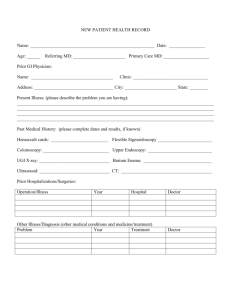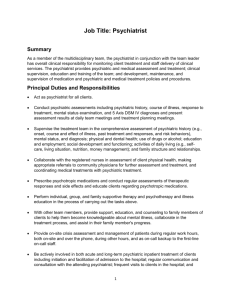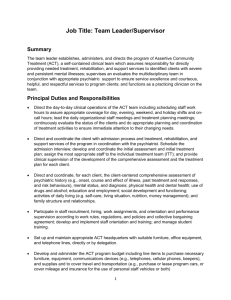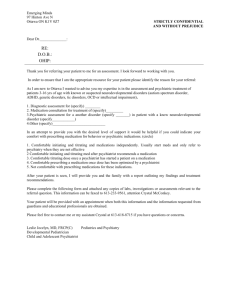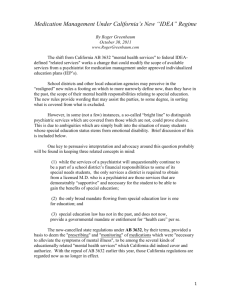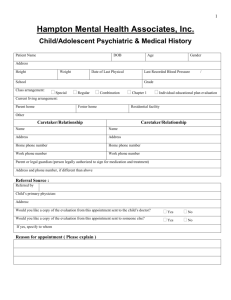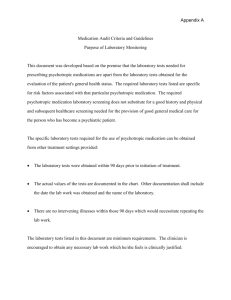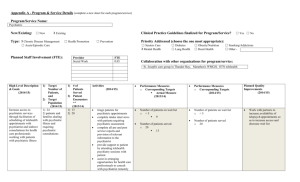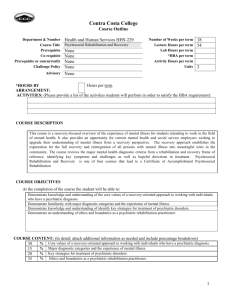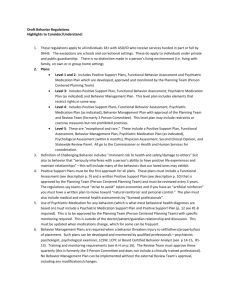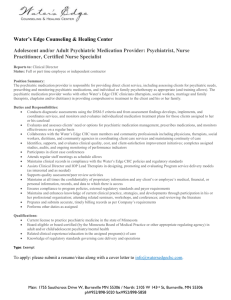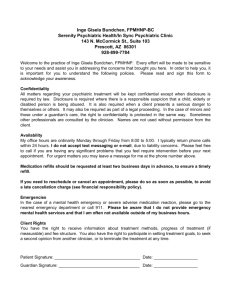- ACT
advertisement
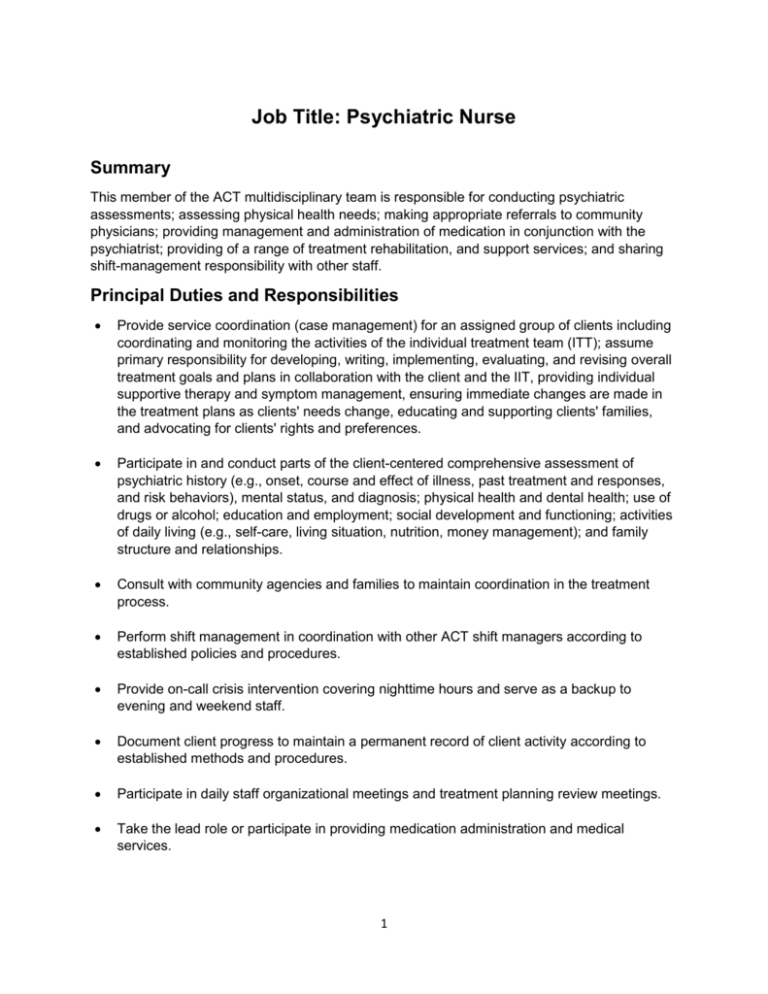
Job Title: Psychiatric Nurse Summary This member of the ACT multidisciplinary team is responsible for conducting psychiatric assessments; assessing physical health needs; making appropriate referrals to community physicians; providing management and administration of medication in conjunction with the psychiatrist; providing of a range of treatment rehabilitation, and support services; and sharing shift-management responsibility with other staff. Principal Duties and Responsibilities Provide service coordination (case management) for an assigned group of clients including coordinating and monitoring the activities of the individual treatment team (ITT); assume primary responsibility for developing, writing, implementing, evaluating, and revising overall treatment goals and plans in collaboration with the client and the IIT, providing individual supportive therapy and symptom management, ensuring immediate changes are made in the treatment plans as clients' needs change, educating and supporting clients' families, and advocating for clients' rights and preferences. Participate in and conduct parts of the client-centered comprehensive assessment of psychiatric history (e.g., onset, course and effect of illness, past treatment and responses, and risk behaviors), mental status, and diagnosis; physical health and dental health; use of drugs or alcohol; education and employment; social development and functioning; activities of daily living (e.g., self-care, living situation, nutrition, money management); and family structure and relationships. Consult with community agencies and families to maintain coordination in the treatment process. Perform shift management in coordination with other ACT shift managers according to established policies and procedures. Provide on-call crisis intervention covering nighttime hours and serve as a backup to evening and weekend staff. Document client progress to maintain a permanent record of client activity according to established methods and procedures. Participate in daily staff organizational meetings and treatment planning review meetings. Take the lead role or participate in providing medication administration and medical services. 1 Under the direction of the team psychiatrist and in collaboration with other registered nurses on the team, develop, revise, maintain, and supervise team psychopharmacologic and medical treatment and medication policies and procedures including transcribing, administering, evaluating, and recording psychotropic medications prescribed by the team psychiatrist; evaluate and chart psychotropic medication effectiveness, complications, and side effects; and arrange for required lab work according to protocol. Under the direction of the team psychiatrist and in collaboration with other registered nurses on the team, organize and manage the system of getting medication to clients and integrating medication administration tightly into clients' individual treatment plans. Under the direction of the team psychiatrist and in collaboration with other registered nurses on the team, manage pharmaceuticals and medical supplies. In collaboration with the team psychiatrist, coordinate, schedule, and administer medical assessments of client physical health, making appropriate referrals to community physicians for further assessment and treatment, and coordinate psychiatric treatment with medical treatment. Participate in treatment, rehabilitation, and support services. Psychiatric Treatment and Dual Diagnosis Substance Abuse Services Provide ongoing assessment of clients' mental illness symptoms and clients' response to treatment. Make appropriate changes in treatment plans to ensure immediate and appropriate interventions are provided in response to changes in mental status or behavior which put clients at risk (e.g., suicidality). Provide symptom education to enable clients to identify their mental illness symptoms. Provide direct clinical services to clients on an individual, group, and family basis in the office and in community settings to teach behavioral symptom-management techniques to alleviate and manage symptoms not reduced by medication and to promote personal growth and development by assisting clients to adapt to and cope with internal and external stresses. Provide individual and group treatment in the office and in community settings in a stagebased treatment model that is non-confrontational, considers interactions of mental illness and substance abuse, and has client-determined goals. Coordinate with outside inpatient services to detoxify clients and establish linkage to selfhelp programs (e.g., Alcoholics Anonymous), outpatient services, and residential facilities. Participate in providing rehabilitation services. 2 Structuring Time and Employment Provide individual vocational-supportive counseling to enable clients to identify vocational strengths and problems, establish vocational or career goals and plans to reach them, and recognize and target symptoms of mental illness that interfere with work. Plan and provide work-related supportive services, such as assistance with grooming and personal hygiene, securing of appropriate clothing, wake-up calls, and transportation. Teach job-seeking skills. Develop individualized jobs based on clients' needs, abilities, and interests. Conduct on-the-job performance assessments and evaluations, regular work review sessions with clients and their employers, on-the-job support, and crisis-assistance contacts. Perform job coaching, problem solving, and support on and off the job site. Coordinate with state vocational rehabilitation and other employment services. Provide benefits counseling (e.g., Income /Disability Assistance). Activities of Daily Living Services Provide ongoing assessment, problem solving, side-by-side services, skill training, supervision (e.g., prompts, assignments, monitoring, encouragement), and environmental adaptations to assist clients with activities of daily living. Assist clients to find and maintain a safe and affordable place to live - apartment hunting, finding a roommate, landlord negotiations, cleaning, furnishing and decorating, and procuring necessities (e.g., telephone, furnishings, and linens). Assist and support clients to carry out personal hygiene and grooming tasks. Provide nutrition education and assistance with meal planning, grocery shopping, and food preparation. Assist and support clients to perform household activities, including house cleaning and laundry. Ensure that clients have adequate financial support (e.g., help to gain employment or apply for entitlements). Teach money-management skills (e.g., budgeting and bill paying) and assist clients in accessing financial services (e.g., professional financial counseling, emergency loan sources). 3 Help clients to access reliable transportation (e.g., obtain a driver's license and car, arrange for cabs, access bus line, and find rides). Assist and support clients to have and effectively use a personal primary care physician, dentist, and other medical specialists as required. Social and Interpersonal Relationships and Leisure Time Provide individual supportive therapy (e.g., problem solving, role-playing, modeling and support), social- skill development, and assertiveness training to increase client social and interpersonal activities in community settings. Plan, structure, and prompt social and leisure-time activities on evenings, weekends and holidays. Provide side-by-side support and coaching to help clients socialize (e.g., going with a client to a basketball game, coaching and supporting a client before he or she goes to a family reunion). Organize and lead individual and group social and recreational activities to structure clients' time, increase social experiences, and provide opportunities to practice social skills and receive feedback and support. Support Provide practical help and supports, advocacy, coordination, side-by-side individualized support, problem solving, direct assistance, training, and supervision to help clients obtain the necessities of daily living including medical and dental health care; legal and advocacy services; financial support such as entitlements (e.g., Income/Disability Assistance, CPP, federal disability tax credit) or housing subsidies; supported housing (e.g., adult foster care; paid roommates, meals brought in for those who need it); money-management services (e.g., payeeships); and transportation. Education, Experience, and Knowledge Required The psychiatric nurse may have a master's, bachelor's or associate degree in nursing, must be licensed as a registered nurse, and should have at least one year of work experience in an inpatient or outpatient psychiatric setting. Must have a strong commitment to the right and ability of each person with a severe and persistent mental illness to live in normal community residences; work in market jobs; and have access to helpful, adequate, competent, and continuous supports and services. Skills and competence to establish supportive trusting relationships with persons with severe and persistent mental illnesses and respect for client rights and personal preferences in treatment are essential. Must have a valid driver's license for the state in which the program operates. 4
